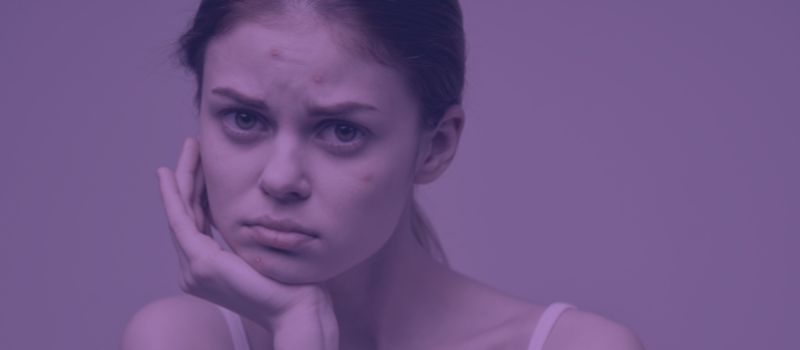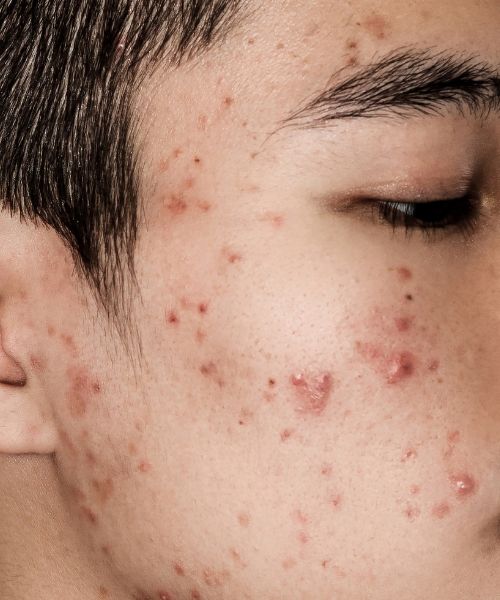Acne itching is a common problem, and understanding the potential causes can help you take the right steps to soothe it.
Many individuals experience acne itching as part of their breakouts, and the causes can range from the obvious (like skin irritation caused by a breakout) to more subtle triggers like accessories that get in touch with our skin and irritate it.
Therefore, in this article, we will discuss some potential causes of acne itching and the best ways to soothe it.

Why Does Acne Itch?
Acne is a bacterial condition caused by several factors, including excess oil, dead skin cells, bacteria, and the immune system’s reaction.
These factors can block pores, leading to inflammation and an itchy sensation.
However, there may be other factors at play as well. Here are some potential causes of acne itching:
Allergies
Allergies can sometimes appear as rash-like acne and lead to an itchy sensation. Frequently caused by household items like detergents and conditioners, as well as cosmetic products and even food, allergies can be challenging to pinpoint as a cause.
However, if you’ve noticed a pattern between specific products and your itchiness, it’s worth looking into and cutting out the potential culprit from your routine to prevent further complications and health hazards.
Fungal Infection
Fungal acne, or Malassezia folliculitis, is a condition that resembles acne but is caused by an overgrowth of yeast on the skin.
Appearing as raised, white or red bumps surrounded by redness, this type of acne usually appears in clusters in oily areas of the skin, such as the forehead, and it tends to itch, unlike regular bacterial acne.
Friction
Friction can cause acne to itch, especially if clothing or accessories such as hats, caps, helmets, and sweatbands are too tight.
Pair this with inflammation caused by acne-causing bacteria, and the itch can become unbearable.
To prevent this, wear loose-fitting clothing that’s not too tight around where acne lesions appear.
Dryness
Dryness can also cause acne to itch, especially if you are using drying treatments or medications to tackle your skin condition.
To avoid dryness and itching, use a hydrating, non-comedogenic moisturizer that won’t clog your pores but will keep the area soft and hydrated.
Excessive Sweating
Sweat is another potential culprit of itching acne, as this substance can change the skin’s pH, leading to a perfect environment for bacteria to thrive and multiply.
Sweat can also cause the overgrowth of yeast that already resides on the skin, which can further contribute to the development of blemishes and fungal infections.
Therefore, to prevent this, try to keep the area where acne appears clean and dry by blotting it with fragrance-free paper towels.
Scabbing
Scabbing occurs when a bigger pimple starts to heal, and it can cause itchiness, redness, and pain.
If you have scabbed acne, avoid scratching or picking at them, as this can lead to further infection and scarring. Instead, try using a moisturizer or aloe vera gel to keep the area hydrated and protect it from external pathogens as well as encourage the skin to heal faster.
The 10 Best Ways to Soothe Acne Itching

Identify Your Condition
Identifying your condition is crucial in treating it effectively. This is because not all acne respond well to the same treatment, and knowing the underlying cause of your condition can help you choose the right remedy.
For example, fungal acne can’t be treated with regular antibacterial products for acne, as you need something specifically formulated to tackle yeast overgrowth.
On the other hand, if your itching is due to dryness or sweat, you need to cut out the potential culprit and see how your skin reacts instead of causing an imbalance in your skin microbiome by attacking the bacteria that reside on the skin with antibacterial products when it might not even be necessary.
Check the Ingredients of Your Products
Certain ingredients in cosmetic products can trigger acne or worsen the condition by irritating the skin and causing itching.
Therefore, you need to check the ingredients in all your products and try to avoid harsh, drying formulas or those containing isopropyl alcohol, fragrances, and essential oils, as these are known to cause sensitivities on the skin.
Additionally, if you’re dealing with acne, whether bacterial, cystic, or fungal, try to avoid heavy products that contain oils, waxes, and silicones, as these tend to clog pores and exacerbate the problem.
Use a Gentle Cleanser
The last thing you want to do when dealing with acne that itches is to use a harsh, drying cleanser that will further strip your skin and cause the pimples to become more inflamed.
Instead, look for a gentle, non-comedogenic cleanser that doesn’t contain active ingredients like exfoliating acids, vitamin C, or fragrances, as it will help keep the skin clean without over-drying it and further irritating it.
Use a Retinoid
A gentle retinoid will help improve cellular turnover and purge the clogs inside the pores that are causing acne.
Retinoids can also regulate sebum production, control inflammation, and strengthen the skin’s protective barrier, which will prevent future inflammation and reduce the appearance of existing acne.
And best of all, retinoids can help improve both bacterial and fungal acne.
Use an Antifungal
If you want to tackle the problem head-on, speak to your health provider or dermatologist about trying an antifungal cream that contains active ingredients like ketoconazole, which can help inhibit yeast overgrowth on the skin, as well as reduce inflammation and itching.
Apply Calamine Lotion
Calamine is a naturally derived mineral that has been used in traditional medicine for centuries. It consists of zinc oxide, iron oxide, and magnesium carbonate, making it a powerhouse of dermal health benefits.
One of the main benefits of calamine is its anti-inflammatory properties, which make it effective in reducing itching, redness, and inflammation associated with acne.
Therefore, applying calamine as a lotion or a powder as a mask several times a week can help soothe acne itching.
Use a Soothing Moisturizer
A rich, anti-inflammatory moisturizer like the Cicaplast Baume B5 from La Roche-Posay can help soothe itching and reduce redness associated with acne.
The moisturizer contains panthenol, glycerin, and shea butter to nourish the skin and prevent it from feeling dry or uncomfortable.
Additionally, the moisturizer is free of fragrance and drying alcohol, meaning it’s suitable for all skin concerns, including sensitive and reactive skin.
Apply Cold Compress
A cold compress can help reduce the sensation and soothe the affected area if your skin is feeling extra itchy and inflamed.
Therefore, place a clean, sterilized cloth in a bowl with cold water and apply it to the affected area for 10-15 minutes several times per day.
Alternatively, you can use a cold washcloth or an ice pack wrapped in a cloth to reduce itching and redness associated with acne.
Stay Away From Heat
Whether your acne is on your face or larger areas of the body like the back and bum, staying away from heat like excessive sun exposure or hot showers can go a long way in reducing inflammation and itching associated with the condition.
Heat tends to worsen the condition due to enlarging the blood vessels under the skin, making them pump more blood to the area and consequently making the skin more inflamed.
So, limit your hot showers or baths to just 10 minutes, avoid sun exposure, and wear protective clothing when going outside.
Do Not Scratch
This is the most important rule to follow when dealing with acne itching.
Scratching can not only irritate the existing pimple and leave the skin exposed to infection, but it can also spread bacteria from under the nails and cause further inflammation.
Finally, constantly removing the top layer of your skin by scratching it can cause scar formation, leaving a permanent discoloration or indented area on the skin.
Therefore, make sure to keep your hands off your skin and resist the urge to scratch your pimples.

My name is Simone and I am a certified skin specialist. I created this website to teach my readers how to take great care of their skin and I also like to occasionally share my honest opinions on skincare products I’ve tried. You can learn more about me here.
